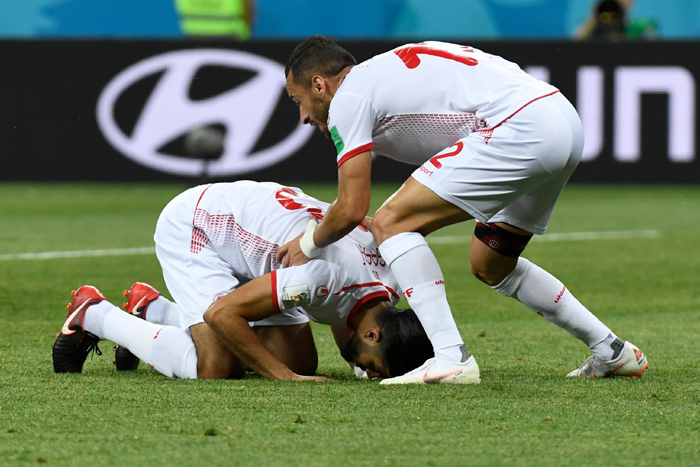Despite no hope of return from a three-goal defeat against Russia on Tuesday, Egypt star Mohamed Salah celebrated his side's only goal against Russia- scored from a penalty in the 73rd minute – in his known style of kneeling with his head on the ground.
Aside from disqualifying for the round of 16, the English Premier League player of the season has added to his personal record, scoring Egypt's first goal in the World Cup since Magdi Abdel-Ghani's penalty against the Netherlands in 1990. But why does Salah kneels on the ground to celebrate?
Salah's triumph in Europe with Liverpool made the kneeling goal-celebration widespread, with some thinking his celebratory style is him kissing the pitch.
The celebration is being imitated by young Salah fans across the globe, just as the styles of various star players are repeated by their fans.

A snapshot from a video published by Liverpool documenting Salah's surprise visit to a school in England
But the origin of Salah's celebration style is actually related to the teachings of the 1400-year-old religion Islam, currently followed by around 1.8 billion people, or almost a quarter of the earth's population; second globally after the 2.4 billion of Christianity, according to latest international statistics.
It's called sujood in Arabic, the language of the Prophet Muhammad, whose biggest miracle according to his believers is his holy book Al-Quran Al-Karim, which is in the same language and is believed to be linguistically, scientifically and spiritually miraculous.
Sujood is a major ritual of Muslims practice, and they are obliged to repeat it at least 34 times in total within the five prayer-times they observe daily. They believe this posture allows them to make the closest connection with God.
The type of sujood that Muslim athletes do is a recommended ritual, which is not obligatory, but is a way to show gratitude and thanksgiving to Allah.

Tunisia's midfielder Ferjani Sassi (L) celebrates scoring a goal against England (AFP)
Salah's sujood is not the first to be performed at the 2018 World Cup, as a few other players have celebrated in the same style. These include Russia's Denis Cheryshev during their 5-0 win in the opener, and Tunisia's Ferjani Sassi, who celebrated after scoring a penalty in Monday's 2-1 defeat to England.
As well as being cultural and sometimes political, religious celebration styles are widespread in worldwide football arenas, with the most remarkable moment recorded in Indonesia, when three Bali FC players celebrated with Jewish, Christian and Muslim signals at the same time.
Egypt, whose return home is a foregone conclusion, have one remaining game in the World Cup, against fellow Arab and Muslim country Saudi Arabia, that will decide third-place in their group.
(For more sports news and updates and a special World Cup 2018 coverage, follow Ahram Online Sports on Twitter at @AO_Sports and on Facebook at AhramOnlineSports )